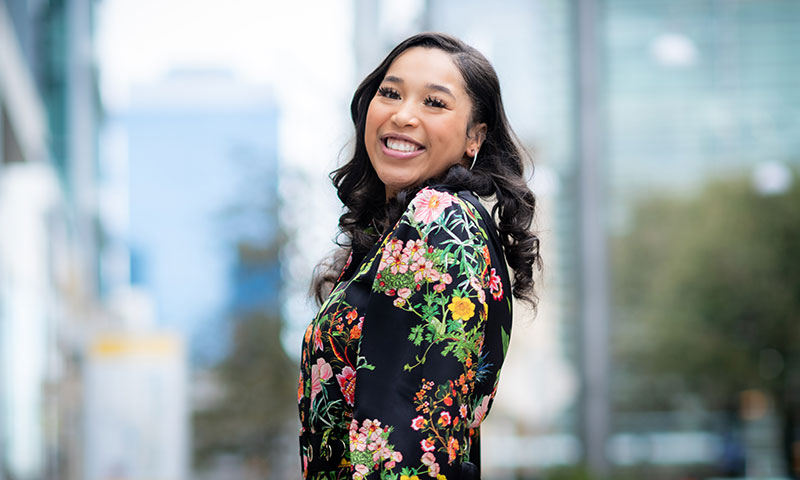College sophomore Sydney's life revolves around her online courses at Southern University (her dream school) where she's majoring in mass communications.
Last year, Sydney had to take a break from school and move back home to receive lifesaving care at Children's Health℠. But even from her parent's dining room table, she's back in school focusing on her studies with the same drive and passion for learning. She's back with the same bright smile and pride for her university. The only thing different about Sydney is her heart – and her liver.
"I've known for my entire life that eventually I might need a heart transplant and maybe a liver transplant. I was ready," Sydney says.
Her team of doctors was ready too. Leading her care team was Ryan Butts, M.D., Medical Director of the Pediatric Advanced Cardiac Care Program at Children's Health and Associate Professor at UT Southwestern.
"As sick as Sydney was when I met her, she had a cheerfulness that couldn't be clouded," Dr. Butts says. "But seeing her enrolled back in college just a few months after surgery is amazing. Now I truly understand what a gifted and talented person she is and that's the whole reason we do our jobs – to see our patients thrive outside of the hospital."
Sydney was one of the first pediatric patients in the country to receive a heart and liver transplant with the help of an innovative technology called normothermic machine perfusion (NMP). NMP helps keep donated organs as healthy as possible before and during transplant, leading to more effective procedures and better outcomes for patients like Sydney.
"This technology does a lot of important things for us in the operating room. But it also means patients often spend less time in the hospital and rehab will move more quickly," says Christine Hwang, M.D., Pediatric Transplant Surgeon at Children's Health and Associate Professor at UT Southwestern.
Sydney's cardiac care began with a sonogram
When Sydney's mom Chelle was pregnant, she got a bit of special treatment from her OB/GYN. That's because the clinic she went to was also where Sydney's dad, Marc, practiced. They did quite a few sonograms. But they never expected that these scans would reveal a heart problem. Or that their baby, Sydney, would be born with hypoplastic left heart syndrome (HLHS), which happens when the left side of the heart doesn't fully develop.
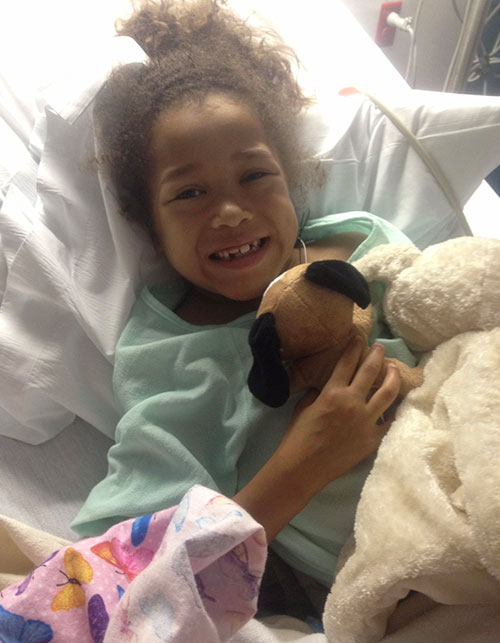 "She had her first surgery at a few days old and they had to leave her chest open. I could actually see her heart pumping," Chelle says. "The first time I held her was intimidating. There were so many tubes and machines connected to her little body. But something about this baby was so peaceful, I knew she was going to make it."
"She had her first surgery at a few days old and they had to leave her chest open. I could actually see her heart pumping," Chelle says. "The first time I held her was intimidating. There were so many tubes and machines connected to her little body. But something about this baby was so peaceful, I knew she was going to make it."
Sydney had two more open heart surgeries before her fourth birthday.
"I couldn't do sports, but I did dance, so that was my sport," Sydney says. "But otherwise, I grew up pretty normal."
After graduating with the class of 2022, Sydney was off to Southern University. It was everything she hoped it would be. But during her second semester, she started to realize that even a walk between classes left her feeling exhausted. Then she started feeling severe pain in her stomach.
"One day Sydney called me and said, ‘Mom, I need to come home.' This was a girl who would push through anything and the worst thing she could imagine was leaving school," Chelle says. "I booked her on the next flight and when I went to get her from the airport, she collapsed in my arms crying and told me how much everything hurt. I knew her next heart journey was beginning."
Planning and preparing for a complex procedure
Sydney and her parents soon met with a team of The Heart Center and Pediatric Liver Transplant Program doctors who began to unpack everything about Sydney's health and make a plan to restore it. This meant Sydney would need an expert care team who could carry out not one but two transplants. At the ready were Dr. Hwang and Ryan Davies, M.D., Pediatric Cardiothoracic Surgeon at Children's Health and Associate Professor at UT Southwestern.
"People born with HLHS often eventually need a heart transplant, and some need a new liver. That's because, even after the surgeries she had when she was little, Sydney's heart wasn't able to bring blood from the liver to the heart as efficiently as it's supposed to," says Dr. Hwang.
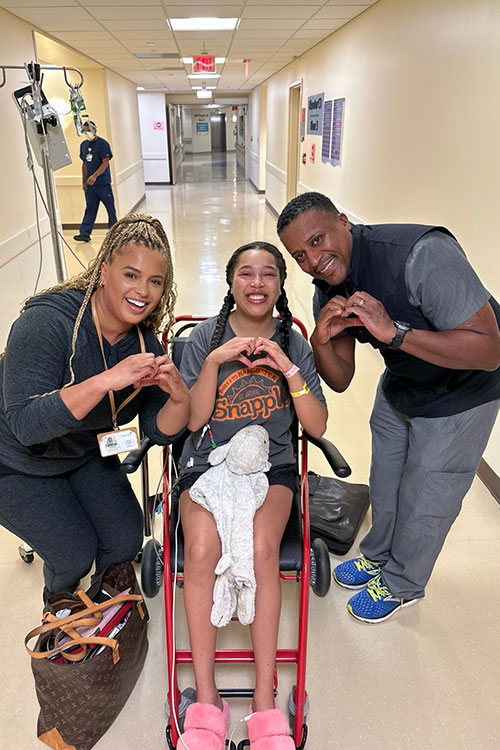
mom Chelle (left) and dad Marc (right).
First Sydney and her family had to endure the complex education and evaluation process that transplant families go through. Together, the family and providers decided that Sydney would move forward with the transplant process, and Dr. Butts began walking them through every aspect of the plan, including the complexities of finding a match .
"Dr. Butts reminds me a lot of my dad," Sydney says. "He broke down all of the medical information so I could understand what was happening and that made me feel a lot better. He spent a lot of time with us and I knew he was the person I could go to for anything."
Dr. Butts was especially impressed with Sydney's commitment to her physical health. He explains that while he was looking at her labs and making adjustments to her medications, Sydney had to work too.
"This surgery takes a huge toll on your body, and the more nutritional reserves a patient has, the better they'll heal. Our patients work closely with a dietitian and they need to stay moving. Sydney did a great job as my partner in maintaining her health," Dr. Butts says.
For Sydney's family, her transplant marked what they hope will be the end of a lifetime of uncertainty fought off by their deep faith and confidence in her care team.
"As a mom, every part of this process is daunting. There were times where I was completely overwhelmed by the hope of the best-case scenario and the realities of the worst," Chelle says. "But I've been watching this girl endure the health challenges that she's been dealt since before she was born."
Moving into Children's Health – Sydney's wait begins
When the physicians finalized their plan, Sydney's surgery would take the majority of a day. On July 5, 2023, Sydney officially moved into Children's Health so she would be ready for donor organs as soon as they were available.
"We have a very special team at Children's who is hyper-focused on making innovations that minimize the time a patient waits for an organ and optimize the health of the organ they receive. One of the tools that can help us succeed is NMP," Dr. Davies says. "Sydney is helping us show the rest of the pediatric transplant community what is possible."
To pass the time, Sydney worked her way through a stack of books. When she needed a boost of faith, she leaned on her Bible. Her friends from home and her new network from college were also a huge support.
Finally, at the end of July, the day had come – two organs were available and they were for her.
"My whole family was with me before my surgery. We prayed together, we took pictures and then a few hours later I woke up and I knew it didn't happen," Sydney says.
A couple of hours into the surgery, while Dr. Davies was preparing to take Sydney's heart out, the donor heart stopped working.
The family was disappointed, but not discouraged. Sydney was determined. She had made it through three major heart surgeries before preschool. She would not give up now.
Almost a month later, another set of organs were ready for Sydney.
"Our original liver transplant surgeon was out of the country, so we met Dr. Hwang that day, which was overwhelming because parts of the plan changed and we had been planning every moment of this procedure for months," Chelle remembers. "Even with the changes, we felt the team's confidence. They wanted this for Sydney as much as we did."
NMP offers a win-win for patients and providers – less waiting and healthier organs
As the team prepared for the second procedure, Dr. Davies and Dr. Hwang closely evaluated the donor heart and liver. Dr. Davies would perform the heart transplant, and then Dr. Hwang would step in for the liver.
With the second set of donor organs, Sydney's doctors had the opportunity to utilize the NMP system. They wanted to keep the donated organs as healthy as possible before and during the surgery, ensuring the most effective procedure and the best outcome for Sydney.
"Every minute an organ spends not working in a body, its cells start to break down. An organ sitting on ice is only viable after about 4 to 6 hours," Dr. Davies says. "NMP keeps warm oxygen-rich blood pumping through it, mimicking the body's natural conditions."
The machine minimizes the shock an organ experiences being moved from one body to another and can double or triple the duration of the organ's viability. This would keep the new liver healthier longer, which was crucial in case there were any unforeseen challenges with the heart transplant.
Once again, Sydney's family embraced her with love and prayers until it was time for her to go.
"Sydney's surgery was on a Sunday and our family had the whole waiting room to ourselves. We got regular updates from her team. It was a long day and night and her surgery went well into the next morning. We were grateful for every milestone she made it through," Chelle says.
In the operating room, Dr. Davies was glad to see how well Sydney's new heart was doing with the support of NMP.
"NMP provided a lot more information about the heart's health as I was operating. It also meant that I had a better understanding of how the heart was going to do when I passed her to the liver team," Dr. Davies says.
During the heart transplant, Dr. Hwang optimized the health of Sydney's new liver as it received blood and oxygen from the NMP machine.
"As Dr. Davies was finishing, we all saw that the heart was doing great and that set us up for a smooth liver transplant," Dr. Hwang says.
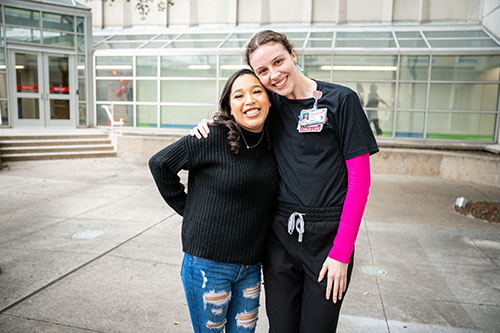
Child Life Specialist at Children’s Health (right).
After 88 days in the hospital and surgery that started on a Sunday and ended on Monday, Sydney finally had a healthy heart and liver. Chelle and Marc were able to see their daughter. Reuniting with Sydney made them even more proud of her strength and hopeful for her future.
"She was on a ventilator for a few days, it was probably a week before she was awake enough to realize it happened, so I sat with her and held her hand and waited for her to wake up here and there and squeeze my hand back," Chelle says .
For Sydney, the most difficult part of the experience was the recovery. She spent the first couple of weeks with bandages wrapped around her body, making it difficult for her to move. Her throat burned for days after the ventilator was removed. Sometimes the nerve pain felt unbearable. When she was finally able to stand, walking became another hurdle she wasn't expecting.
"My rehab team and the nurses kept telling me I had to give myself grace. At first, it was hard to celebrate my progress, because walking should be easy," Sydney says. "Once I could walk, I was on my way to finally going home."
A new chapter for Sydney and the Children's Health transplant teams
Today, Sydney is looking forward to starting her junior year and taking her next round of courses in person. And Dr. Butts is doing everything he can to help her achieve that goal.
 "I have to understand a lot about a patient's health and the care they need. It's a huge responsibility," Dr. Butts says. "But building a strong relationship with Sydney and her family, really knowing who they are is what sets me up to be a strong advocate for her. It's also the most rewarding part of this job. Now, we get to work on continually increasing her health so she can go back to school."
"I have to understand a lot about a patient's health and the care they need. It's a huge responsibility," Dr. Butts says. "But building a strong relationship with Sydney and her family, really knowing who they are is what sets me up to be a strong advocate for her. It's also the most rewarding part of this job. Now, we get to work on continually increasing her health so she can go back to school."
Drs. Davies and Hwang are looking forward to continuously improving pediatric transplant medicine.
Both physicians emphasize the importance of their larger Pediatric Heart Transplant and Solid Organ Transplant Center team's commitment to improving standards of care and building avenues to reduce the time that patients spend waiting for organs.
"Everyone at Children's Health wants to take on the greatest challenges in transplant medicine. With NMP, we have the opportunity to qualify more organs and take on more complex cases. That means a lot to me as a physician, but it means even more to the families whose kids are very sick," Dr. Davies says.
Equally important is their partnership with families like Sydney's.
"Since the moment she was born, Sydney has faced challenges most people will never understand and somehow she did it with positivity. She is the inspiration that pushes our team to keep making life better for children." Dr. Davies says.
Sydney is more than ready for her next chapter to begin.
"This surgery offered me a path to actually begin my story and to pursue everything I want to in life," Sydney says. "I'm very grateful to my doctors, my family, my friends and the donor's family for giving me the gift of a brighter future."
Learn more
Children's Health is one of a few institutions in the country – and the only one in North Texas – with the expertise and technology to provide heart transplants for children. Our program is one of the largest and most experienced in the country, performing more than 500 transplants on children of every age, from infants to young adults each year. Learn more about our Pediatric Cardiology and Cardiothoracic Surgery Programs.
Children's Health is home to one of the largest comprehensive pediatric transplant surgery programs in the country – with the skills and resources to diagnose and treat every aspect of organ health and care. Our providers lead with patient- and family-centered care that produces outcomes that exceed national standards. Learn more about our Pediatric Solid Organ Transplant Center.
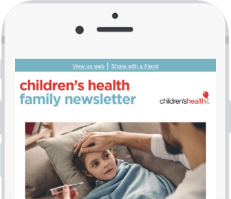
Thank you!
You are now subscribed to the Children's Health Family Newsletter.
Children's Health will not sell, share or rent your information to third parties. Please read our privacy policy.
